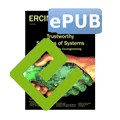by Michel A. Reniers, Sebastian Engell and Haydn Thompson
The CPSoS project (http://www.cpsos.eu) is developing a European roadmap for future research activities in Cyber-Physical Systems of Systems (CPSoS), which are large complex physical systems that interact with and are controlled by a considerable number of distributed and networked computing elements and human users [1]; see Figure 1. Examples include automotive systems [2], rail systems, electric grids, smart buildings, and large production facilities.
To date, research activities on CPSoS have largely been performed by individual domains, e.g. computer science, simulation technology and systems and control, with little cooperation and exchange between the different areas. To capture the views of industry and academia and from different communities, the CPSoS project has set up three working groups:
- Systems of Systems (SoS) in Transportation and Logistics,
- Physically Connected Systems of Systems,
- Tools for Systems of Systems Engineering and Management.
The working groups currently comprise 36 members, leading specialists from industry and academia, and include delegates from ongoing EU-funded projects in the area of SoS to ensure that as many views as possible are represented. Members of the working groups are listed at http://www.cpsos.eu.
![Figure 1: Explanation of Cyber-Physical Systems of Systems, from [3]. Figure 1: Explanation of Cyber-Physical Systems of Systems, from [3].](/images/stories/EN102/reniers.jpg)
Figure 1: Explanation of Cyber-Physical Systems of Systems, from [3].
By means of three industry/academia working groups, public workshops and consultations and interviews with over 100 practitioner experts in the field from large companies, mid-caps, SMEs and academia, the project has produced a comprehensive view of the state-of-the-art in transport and logistics, electric grids, smart buildings, industrial production systems and in supporting tools and techniques (see http://www. cpsos.eu/state-of-the-art/). The discussions in the working groups and the consultations have been summarized in a working paper on the core research and innovation areas (see http://www. cpsos.eu/roadmap/). Three key research topics, described below, have been identified:
Challenge 1: Distributed, reliable and efficient management of Cyber-Physical Systems of Systems
Owing to the scope and complexity of CPSoS as well as the ownership or management structures, the control and management tasks in such systems cannot be performed in a centralized or hierarchical top-down manner with one authority tightly controlling all subsystems. In CPSoS, there is a significant distribution of authority with partial local autonomy [3]. The design of such management systems for reliable and efficient management of the overall systems poses a key challenge in the design and operation of CPSoS.
The following sub-topics should be addressed:
- Decision structures and system architectures,
- Self-organization, structure formation, and emergent behaviour in technical systems of systems,
- Real-time monitoring, exception handling, fault detection and mitigation of faults and degradation,
- Adaptation and integration of new components,
- Humans in the loop and collaborative decision making,
- Trust in large distributed systems.
Challenge 2: Engineering support
for the design-operation continuum of Cyber-Physical Systems of Systems
While model-based design methods and tools have been established in recent years in industrial practice for traditional embedded systems, the engineering of CPSoS poses key challenges that go beyond the capabilities of existing methodologies and tools for design, engineering, and validation. These challenges result directly from the constitutive properties of CPSoS, such as their process of continuous evolution and the high degree of heterogeneity and partial autonomy of CPSoS.
The efficient design and operation of such systems requires new design support methodologies and software tools in the following areas:
- Integrated engineering of CPSoS over their full life-cycle,
- Modelling, simulation, and optimization of CPSoS, and
- Establishing system-wide and key properties of CPSoS.
Challenge 3: Cognitive Cyber-Physical Systems of Systems
SoSs by their very nature are large, distributed and extremely complex, presenting a myriad of operational challenges. To cope with these challenges there is a need for improved situational awareness. Gaining an overview of the entire SoS is inherently complicated by the presence of decentralized management and control. The introduction of cognitive features to aid both operators and users of complex CPSoS is seen as a key requirement for the future to reduce the complexity management burden from increased interconnectivity and the data deluge presented by increasing levels of data acquisition. Research in a number of supporting areas is required to allow vertical integration from the sensor level to supporting algorithms for information extraction, decision support, automated and self-learning control, dynamic reconfiguration features and consideration of the sociotechnical interactions with operators and users.
The following subtopics have been identified as being necessary to support a move to Cognitive CPSoS:
- Situation awareness in large distributed systems with decentralized management and control,
- Handling large amounts of data in real time to monitor the system performance and to detect faults and degradation,
- Learning good operation patterns from past examples, auto-reconfiguration and adaptation,
- Analysis of user behaviour and detection of needs and anomalies.
- A public consultation process on the roadmap was undertaken in April-June 2015 (results: http://www.cpsos.eu/ public-consultation/).
The research topics listed above provide a strategic long-range research agenda. The working groups of CPSoS will complement this strategic research agenda by sector-specific medium-term research and innovation topics that should be tackled by cooperative research projects in the near future.
Further information will be provided in the CPSoS newsletter which is available via http://www.cpsos.eu/news-events/ news/.
The CPSoS project has received funding from the European Union Seventh Framework Programme (FP7/2007-2013) under grant agreement n° 611115.
Link: http://www.cpsos.eu
References:
[1] M. A. Reniers, Sebastian Engell: “A European Roadmap on Cyber-Physical Systems of Systems”, ERCIM News 2014 (97), 2014.
[2] R. Boagey: “Automotive Cyber-physical systems: the next computing revolution”, Automotive Megatrends, Q3, pages 104-106, 2014.
[3] S. Engell, J. Lygeros, S.Grammatico: “The emergence of systems of systems”, Pan European Networks: Science & Technology, Vol 14, pages 79-81, 2015, http://www.paneuropeannetworkspublications.com/ST14/#78
Please contact:
Michel Reniers, TU/e, The Netherlands
E-mail:











